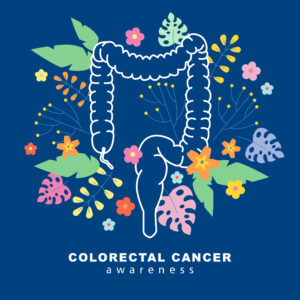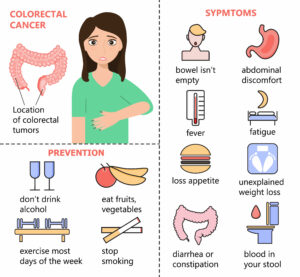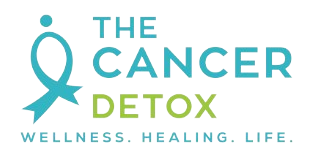The Optimal Colon Cancer Diet: Fiber is Key to Prevention
A colon cancer diet can be one that promotes the disease or prevents it. We will explore both in this article, identify the cancer fighting foods that fight colon cancer, and discuss African American healthcare disparities related to this disease…

National Colorectal Cancer Month, Colorectal Cancer Awareness. Treatment and prevention through colon cancer prevention diet
INTRODUCTION
Colon cancer rates in 2023 are expected to be 153,000 [1]. In the United States it ranks third for the most commonly diagnosed cancer and cancer-related deaths [1]. Globally, it affects 1 million people annually and has a high death rate as nearly one-third will succumb to the disease [2].
The colorectal cancer rate in African Americans is 65 in 100,000 compared to rural South Africans, where it is less than 5 in 100,000 [2]. The incidence in all Americans from different ethnic backgrounds and racial groups is 71.2 in 100,000 [1]. African Americans, therefore, have a slightly lower incidence of colon cancer compared to the total population; however, African Americans have a higher death rate compared to the overall American population.
IN THIS ARTICLE, YOU WILL:
- Learn about the most important colon cancer risk factors, such as diet, overweight/obesity, and hereditary factors
- Learn what comprises a colon cancer diet
- Get info on how healthcare disparities affect African Americans as it relates to colon cancer, and how this group can potentially lower their risk of the disease with cancer fighting foods
- Get a list of high-fiber foods and a daily meal plan that delivers 15 grams of fiber (fiber is key for a colon cancer prevention diet)
- If you like this info, then sign up for the early-bird list for my NEW BOOK “Cancer Prevention: Diet and Lifestyle Factors that Reduce Your Risk.” Get a 50% discount off regular price during pre-release + an e-Guide on Spirulina for weight loss, heart healthy, skin care, and eye health
COLON CANCER RISK FACTORS
It is the Western lifestyle that appears to cause the majority of colon cancer cases in the U.S. and Europe (where the incidence is 250,000 in the European population) [2]. Studies in immigrant populations show that it takes one generation for people who move to the United States to have a similar incidence of colon cancer as those born in the U.S. [1]. The scientific evidence now shows that a colon cancer diet benefits from increasing fiber consumption, and reducing red meat, processed red meat and alcohol consumption.
The following risk factors have been shown to increase the risk of colon cancer:
38% INCREASE IN COLON CANCER DUE TO POOR DIET
- Compared to other types of cancers, colon cancer has the highest risk of development due to a poor diet. In fact, if there ever was a “colon cancer diet” that increases the risk of this disease, it would consist of the following: 1) high red meat and processed red meat and 2) little to no whole grains in the diet.
- 38.3% of colon cancer cases are due to this type of “poor” diet (though you could argue it is a diet of the rich) [3].
- Eating at least 50 grams a day of processed meat increases the risk of colon cancer by 18% (about 2 strips of bacon or 1 hot dog) [4]
15% OF COLON CANCER IS HEREDITARY
- Approximately 15% of colon cancer cases are due to inheriting DNA mutations [5]
10-20% OF COLON CANCER DUE TO TOBACCO USE
- The exact incidence is not known however, it is estimated to cause about 10 – 20% of colon cancer cases
2 OR MORE ALCOHOLIC DRINKS INCREASE RISK
- Drinking approximately 30 grams of alcohol (2 or more drinks) every day increases the risk of colon cancer [6]
BEING OVERWEIGHT OR OBESE INCREASES RISK
- Being overweight or obese has been linked to an increased risk of colorectal cancer, as well as breast, prostate, pancreatic, and other cancer types [6]
OTHER FACTORS
- Toxic chemicals, some types of bacterial and viral infections, and antibiotic use may increase the risk of colon cancer as well

Colorectal cancer symptoms
BENEFITS OF FIBER ON COLON HEALTH
A colon cancer diet that potentially increases the risk of this disease are the foods you want to avoid eating (see #1 above). A colon cancer diet focused on prevention is essentially a diet consisting of high fiber foods. A high fiber diet = a colon cancer prevention diet. Why? Fiber works to fight colon cancer in the following ways:
1. PULLS OUT TOXINS
- Fiber works by pulling toxic chemicals out of the gastrointestinal (GI) tract, thus decreasing the exposure to the cells of the colon
2. INCREASES MOVEMENT OF STOOL
- Fiber increases the rate stools travel through the colon. The less time the stool stays in the colon, the better. That means the less chance toxins in the stool come in contact with the cells of the colon
3. CELLS OF THE COLON ARE HEALTHIER
- As you learned in high school biology, food travels through the GI tract, which is essentially one long tube from the mouth to the rectum. Food gets broken down into its molecular components while traveling the GI tract. The food particles get transported from the GI tract to the interior of the body. You need the cells of the colon to be healthy so they are effective in transporting food to the inside of the body where your blood and organs are located. The human gut contains trillions of bacteria and fungi (about 100 trillion) which are collectively known as the gut microbiome. Here’s how the gut bacteria and fiber interact:
- When you eat fiber, the bacteria in your gut use it as food. A by-product of consuming fiber is what’s collectively known as short-chain fatty acids (SCFAs), of which butyrate is one type
- The colon cells “feed” on butyrate. Healthy colon cells rely on butyrate to be present and take it up for transport into the body
- Butyrate stimulates the release of a protein chain known as GLP-1 (glucagon-like peptide 1). GLP-1 is important for healthy metabolism! It lowers blood sugar levels, reducing the risk of type II diabetes
OPTIMAL COLON CANCER DIET
So you can see how high fiber diets increase the amount of the SCFA butyrate, which helps keep colon cells healthy, and also lowers the risk of colon cancer and type II diabetes. It makes sense that eating a diet high in fiber helps in colon cancer prevention because of the direct action fiber has in the target organ, the colon!
Eating high-fiber foods or a diet high in fiber (at least 15 grams of fiber a day) is easier than you think. These are the cancer fighting foods found in our optimal colon cancer prevention diet, which consists of:
1. WHOLE GRAINS LOWER COLON CANCER RISK BY 17%
- Whole grains contain about 1 – 2 grams of fiber per serving. A recent study found that eating 3 servings of whole grains daily reduces colorectal cancer risk by 17% [6]. In fact, with every 15 grams of whole grains eaten a day, there is a 2 – 19% reduction in total rates for colon cancer (as well as reductions in death, coronary heart disease, and type II diabetes) [7]
2. 10 GRAMS OF FIBER LOWERS RISK BY 7 – 10% (THINK: FRUITS, VEGETABLES AND LEGUMES)
- Fruits and vegetables contain about 2 – 3 grams of fiber per serving, and legumes contain about 8 grams per serving. Therefore you want to eat a lot of these foods as it will increase your fiber intake dramatically.
- Consuming a high-fiber diet has been shown to protect against colorectal, colon, and rectal cancers. A recent meta-analysis review of published studies showed that for every 10-gram increase in dietary fiber, the risk of colon cancer was reduced by 7 – 10% [4]
AFRICAN AMERICANS AND COLON CANCER
As mentioned in the introduction, African Americans bear a higher burden of colon cancer due to the increased mortality from this disease. I have noticed key points missing from the messaging on colon cancer prevention. These key points include how much fiber should be eaten and what a high-fiber diet consists of. For African Americans (and the general U.S. population since the rates of this disease are similar), here are all the key messages you need to leave with! These are more salient points your doctor may not be telling you that may help lower your risk of colon cancer.
Researchers asked 20 healthy African Americans and 20 healthy rural South Africans to switch their diets. The African American diet before the switch consisted of low fiber and high fat (what would be considered a Western colon cancer diet that promotes the disease) [1].
African American Diet Included the Following:
- Breakfast: pancakes and sausage
- Lunch: Hamburger and french fries
- Dinner: Meatloaf and rice
Look familiar to you? It’s an example of a daily diet void of fresh, whole fruits and vegetables (though potatoes are a vegetable, they are often consumed fried in the U.S. diet). The researchers asked participants to switch to a rural South African diet that is high in cancer fighting foods (e.g., fiber, fruits, and vegetables).
Rural South African Diet Included the Following:
- Breakfast: corn fritters, salmon croquettes with corn, bell peppers and onions
- Lunch: corn dogs, homemade tatter tots, mango slices
- Dinner: black eye peas, corn muffins, okra/tomatoes/maize, pineapples, black tea
When African Americans switched their diet to that of rural South Africans, they increased their fiber intake to 55 grams, whereas the diet before the switch consisted of just 15 grams of fiber. This amount is well above the recommended 30 grams of daily fiber. The other major nutritional improvement was a decreased total fat intake from 35% to 16% after the dietary switch.
AFRICAN AMERICANS REDUCED SIGNS OF COLON CANCER
While the length of the study was too short to determine if the participants had a long-term reduction in colon cancer risk, the researchers noted positive changes in the colon cancer cells of African Americans after they switched their diets. These cellular changes have been shown to affect colon cancer risk and include the following:
1. CELL PROLIFERATION DECREASED
- The colon cells were examined to determine if the cells were proliferating (i.e., had continuous cell growth, a hallmark of cancer). They found that the colon cells of African Americans had higher cell proliferation on the Western diet, and was lowered after switching to the “African” high-fiber diet.
- In the rural South Africans that switched from their traditional diet to the Western diet, cell proliferation increased dramatically [2]
2. INFLAMMATION DECREASED
- Markers of inflammation, CD3+ and CD68+ significantly decreased when African Americans switched from their Western diet to the diet of South Africans.
- These markers increased when South Africans switched from their traditional diet to a Western diet [2]
3. INCREASED BY-PRODUCTS OF FIBER (HEALTHY COLON CELLS)
- South Africans eating their traditional diet had significantly higher butyrate levels as compared to when they switched to a Western diet. The same held true for African Americans. The researchers stated: “‘Africanization’ of the diet increased total quantities of butyrate in colonic evacuates 2.5 times, whereas ‘westernization’ reduced quantities by half” [2]
CONCLUSIONS
- A colon cancer prevention diet consists of whole grains, and high fiber (e.g., fruits, vegetables, legumes), and you can start eating high-fiber foods or a diet high in fiber (at least 15 grams of fiber a day) quite easily
- Foods in a colon cancer diet that promote this disease include processed meat and alcohol
- African Americans that were switched from a Western diet to a colon cancer prevention diet increased their fiber intake to 55 grams per day and had less markers of colon cancer (e.g., cell proliferation, inflammation, butyrate levels)
- Scientific evidence suggests that eating more than 50 grams of fiber a day is needed to reduce colon cancer risk [2]
- If you have been diagnosed with colon polyps, you should know that eating 35 grams of fiber daily may not reduce your risk of them returning [2]
- Africans born and raised don’t the continent of Africa should be warned that switching over to a Western diet increases their risk of colon cancer due to a decrease in butyrate, which seems to protect them from the disease (Africans in the study had a high rate of inflammation due to increased presence of parasites) [2]
Here’s To Your Best Health!
Dee Grace, PhD

Hi! I am Dee Grace Ph.D., Scientist and Coach at The Cancer Detox. My career in cancer research has allowed me to work with doctors to find new treatments for this disease. I brought my knowledge to help patients get better care from their doctors during their cancer treatment process, so the focus is on improving their survival outcomes and reducing the financial burden. If you are a cancer patient Schedule a complimentary call with me now to discuss how to reduce your financial burden and 5 questions every patient needs to ask their doctor after a diagnosis (spots fill up quickly, so schedule soon!).
I also ignite people’s passion to adopt a “prevention first!” mindset. Why? Because, so you don’t have to experience the long-lasting health and financial setbacks a cancer diagnosis causes. My new book “Cancer Prevention: Diet and Lifestyle Factors that Reduce Your Risk” focuses on cancer fighting foods and how to adopt a cancer fighting diet. Sign up for my early bird NEW BOOK list and get 50% of the book price + an e-Guide on Spirulina for weight loss, heart health, skin care, and eye health.
REFERENCES
- Siegel RL, et al. Colorectal cancer statistics, 2023. CA: A cancer journal for clinicians. 2023;73:233
- O’Keefe SJD, et al. Fat, fat, fibre and cancer risk in African Americans and rural Africans. Natural Communications. 2015;6:https://doi.org/10.1038/ncomms7342
- Zhang FF, et al. Preventable cancer burden associated with dietary intake in the United States. JNCI Cancer Spectrum. 2019
- Bouvard V, et al. International Agency for Research on Cancer Monograph Working Group. Carcinogenicity of consumption of red and processed meat. The Lancet Oncology, 2015
- Stephens FO, Aigner KR. Basics of Oncology. 2016. Springer Press. New York, NY.
- American Institute for Cancer Research. “Whole grains decrease colorectal cancer risk, processed meats increase the risk: Report analyzing the global research finds hot dogs and other processed meats increase risk of colorectal cancer, eating more whole grains and being physically active lowers risk.” ScienceDaily. ScienceDaily, 7 September 2017. www.sciencedaily.com/releases/2017/09/170907093623.htm
- High intake of dietary fiber and whole grains associated with reduced risk of non-communicable diseases.” ScienceDaily. ScienceDaily, 10 January 2019 www.sciencedaily.com/releases/2019/01/190110184737.htm


